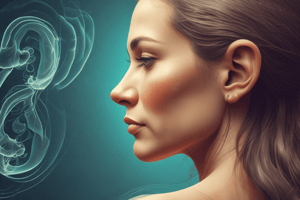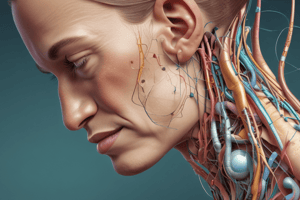Podcast
Questions and Answers
What is a potential cause of otalgia related to dental problems?
What is a potential cause of otalgia related to dental problems?
- Nasal congestion
- Sinusitis
- Sore throat
- Tooth abscesses (correct)
Which nerve-related issue may lead to referred pain resulting in otalgia?
Which nerve-related issue may lead to referred pain resulting in otalgia?
- Femoral nerve compression
- Facial nerve damage (correct)
- Ulnar nerve injury
- Sciatic nerve damage
What is a common symptom of otalgia that may be accompanied by a feeling of fullness in the ear?
What is a common symptom of otalgia that may be accompanied by a feeling of fullness in the ear?
- Vertigo
- Tinnitus
- Decreased hearing (correct)
- Ear discharge
How can over-the-counter pain relievers help in the treatment of otalgia?
How can over-the-counter pain relievers help in the treatment of otalgia?
What is a potential complication of otalgia that might occur with inner ear infections?
What is a potential complication of otalgia that might occur with inner ear infections?
What is a common complication of untreated earaches?
What is a common complication of untreated earaches?
Which of the following is NOT a recommended method for preventing earaches?
Which of the following is NOT a recommended method for preventing earaches?
What is a potential complication of chronic ear infections?
What is a potential complication of chronic ear infections?
How can ear drops containing hydrocortisone help in treating ear infections?
How can ear drops containing hydrocortisone help in treating ear infections?
What is one method for limiting exposure to loud noises and protecting the ears?
What is one method for limiting exposure to loud noises and protecting the ears?
Flashcards are hidden until you start studying
Study Notes
Discovering Otalgia: Causes, Symptoms, Treatment, Prevention, and Complications
Otalgia, the medical term for earache, is a common health issue affecting people of all ages. This article will dive into the causes, symptoms, treatment, prevention, and complications associated with earaches.
Causes of Otalgia
Earaches can arise from various conditions, including:
- Infections: Bacterial or viral infections of the ear, such as otitis media (middle ear infection) or otitis externa (swimmer's ear).
- Blockages: Buildup of earwax or fluid in the ear canal, which can trap bacteria and lead to infection.
- Trauma: Physical injury to the ear, such as a blow to the side of the head.
- Dental problems: Tooth abscesses or gum infections can refer pain to the ears.
- Nerve-related issues: Damage to the facial, trigeminal, or vagus nerves may cause referred pain.
Symptoms of Otalgia
Symptoms of earache can include:
- Pain, which may be sharp or dull, constant or intermittent.
- Tenderness or swelling of the ear.
- Decreased hearing, often accompanied by a feeling of fullness in the ear.
- Ear discharge, which can be yellow, white, or bloody, depending on the cause of the infection.
- Vertigo or dizziness, which may occur with inner ear infections.
Treatment of Otalgia
Treatment options for earaches depend on the underlying cause. Over-the-counter pain relievers, such as acetaminophen or ibuprofen, can alleviate pain and inflammation. For bacterial infections, antibiotics may be prescribed. Ear drops, like those containing hydrocortisone or antifungal agents, can help treat ear infections. In some cases, surgery may be necessary to address severe conditions.
Prevention of Otalgia
Some tips to prevent earaches include:
- Maintaining good ear hygiene: Keep the ear canal free of excess earwax and moisture.
- Practicing safe swimming: Use earplugs or swim caps to prevent water from entering the ear canal.
- Preventing dental problems: Brush and floss regularly to minimize the risk of tooth infections.
- Limiting exposure to loud noises: Use earplugs or earmuffs to protect the ears.
Complications of Otalgia
Earaches can lead to complications, such as:
- Spread of infection: Infections that are not treated promptly may spread to other parts of the body, including the skull, brain, or bloodstream.
- Hearing loss: Chronic infections can lead to the permanent loss of hearing.
- Perforated eardrum: Infections can cause the eardrum to rupture, which may require additional medical treatment.
Understanding the causes, symptoms, treatment, prevention, and complications of otalgia is essential for managing earaches in a timely and effective manner. If you experience ear pain, contact your healthcare provider for a proper diagnosis and treatment plan.
Studying That Suits You
Use AI to generate personalized quizzes and flashcards to suit your learning preferences.




